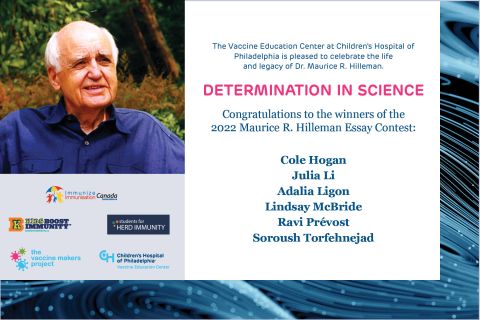Determination in Science: A Celebration of the 2022 MRH Essay Contest Winners

In 2022, the VEC collaborated with Canadian partners Immunize Canada, Students for Herd Immunity and Kids Boost Immunity to expand the essay contest into Canada, increasing the number of winners to six — three from the U.S. and three from Canada. Students responded to the writing prompt, “Maurice Hilleman was a determined scientist. Describe what this means and provide an example of determination in science.” Cole Hogan, Julia Li and Soroush Torfehnejad were the Canadian winners, and the U.S. winners were Adalia Ligon, Lindsay McBride and Ravi Prévost.
In considering how determination is intrinsic to the work of scientists, students took different approaches:
- Cole Hogan observed that, “persistent determination and scientific brilliance fueled Hilleman’s medical work.” Cole also wrote of Frederick Banting and how “his optimism, creativity, and determination to treat individuals diagnosed with Type-1 Diabetes led to his success in becoming one of the co-discoverers of insulin,” noting that, “determination exhibited by those like Banting and Hilleman to advance scientific knowledge have equipped the world with medical advancements that bring relief and safety to children and adults all around the world.”
- Julia Li described science as “a never-ending collective process of tenacious resolve and steadfast commitment by driven individuals. Science is built from determination to create change.” She reflected that, “Great discoveries arise from fierce determination and compassion. Our past and present achievements underscore that the biggest dreams only become a reality when someone was unwilling to stop. Determination is tireless; it’s a fuel that toils to achieve a goal. For Dr. Hilleman, his goal was a pursuit for humanity, to save millions of children from the ravage of infectious disease.”
- Adalia Ligon examined the history of female scientists, telling the story of nuclear physicist Lise Meitner: “Sometimes the hard part of science is the part you should not ever have to do. Sometimes women have to fight for recognition in what they have discovered. In many cases, women have worked hard on their ideas, just to have men claim that it was theirs. This has happened too many times throughout history to count.” Adalia compared Lise Meitner to other determined scientists, like Dr. Hilleman and Jane Goodall, because “she was incredibly determined…. for she continued to work even after people said that she was of no help to the discovery of nuclear fission, even though they were later found to be wrong. She was a remarkable scientist who deserved more credit than she was given.
- Lindsay McBride considered the challenges that Dr. Hilleman faced in his life and career and highlighted the contributions and determination of Dr. Josephine Baker in her quest to reduce infant mortality and keep families healthy in New York City’s poorest areas in 1900. During a time when there were few female or openly gay physicians, Dr. Baker was both: “In a time filled with prejudice and homophobia, Dr. Baker remained committed to serving the most vulnerable populations. Her story is deeply reminiscent of Dr. Hilleman’s undying passion for vaccine research; both offer a potent reminder of how we can persist when challenges arise.”
- Ravi Prévost chronicled the persistence of Australian pathologists, Barry Marshall and Robert Warren, in investigating the cause of gastric ulcers. The scientists questioned the standard explanation of stress as the culprit, suggesting that instead bacteria caused the ulcers. Their discovery eventually earned them the Nobel Prize in Physiology or Medicine in 2005: “Proving their hypothesis took determination over a decade. They had to face numerous setbacks and limitations of experimentation… Ultimately, the overwhelming amount of evidence was able to turn their hypothesis into a theory. As a result, gastric ulcers went from being a chronic disease to an easily curable condition, improving the lives of millions worldwide, much like Dr. Hilleman and his numerous life-saving vaccines.”
- Soroush Torfehnejad wrote about Antoine Lavoisier, a French chemist from the 18th century, noting similarities between Lavoisier and Maurice Hilleman in the manner that Lavoisier “dedicated his mind, body, and soul to the improvement of science and medicine. His devotion to chemistry and mathematics created the foundations for many scientists after him such as Maurice R. Hilleman who create world-changing vaccines and treatments.” Soroush also expressed the importance of determination in success: “Success is an iceberg. People see the top of it but there is so much work that had to be done under the water to be able to create the tip. We only look at success, never the challenges, hardships and problems that come with it. A scientist may fail a thousand times before a breakthrough.”
The six winners were celebrated at a virtual event, "Determination in Science," held on September 23, 2022. The program was hosted by Dr. Paul Offit, director of the Vaccine Education Center and Dr. Hilleman’s biographer. Dr. Hilleman’s wife, Lorraine Hilleman; Chris Monsour, president of the National Association of Biology Teachers (NABT); and Dr. Anne Pham-Huy, chair of Immunize Canada offered remarks. Dr. Abigail Dommer, a postdoctoral scholar at the University of California San Diego, delivered the keynote address. The students presented their winning essays to attendees during the event. They also attended an informal virtual gathering prior to the celebratory event for an opportunity to meet and converse with the event speakers.
Teachers named in each student’s winning entry received a signed copy of Pandora’s Lab: Seven Stories of Science Gone Wrong, written by Paul A. Offit, MD, and a 1-year, complimentary membership to the National Association of Biology Teachers, graciously provided by NABT.
